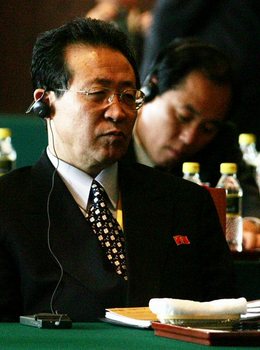Posted on : Nov.1,2006 13:41 KST
Modified on : Nov.2,2006 14:25 KST
 |
|
North Korea's vice foreign minister Kim Gye-gwan participated in the 5th round of six-party talks in Beijing, September 9, 2005
|
North Korea confirmed Wednesday its intention to return to international negotiations over its nuclear weapons program, adding that U.S. financial sanctions which have kept it away from the negotiating table will be discussed at the upcoming round.
"The DPRK decided to return to the six-party talks on the premise that the issue of lifting financial sanctions will be discussed and settled between the DPRK and the U.S. within the frame work of the six-party talks," a spokesman for the North's Foreign Ministry said in a statement carried by the state's Korean Central News Agency. DPRK stands for the North's official name, the Democratic People's Republic of Korea.
The statement followed an announcement by China's Foreign Ministry on Tuesday that the chief nuclear negotiators of the United States, North Korea and China agreed to resume the nuclear talks at an early date agreed on by all participants at the talks.
The nuclear disarmament negotiations are also attended by South Korea, Japan and Russia.
The proposed resumption of the nuclear talks comes after nearly a year-long boycott by Pyongyang, which said it will not return to the talks until Washington lifts its sanctions on a Macau bank suspected of assisting the North in laundering counterfeit U.S. dollars printed in the communist state.
Christopher Hill, Washington's top nuclear negotiator, said Tuesday following his meeting with his North Korean and Chinese counterparts in Beijing that North Korea "did not make any conditions" for its return to the nuclear disarmament talks.
The U.S. assistant secretary of state said the financial issue would be discussed at the envisioned round of the six-party talks, but added that it was not a precondition for the North's return.
"They made very clear these were not conditions, but they wanted to hear that we would address the issue of the financial measures in the context of the talks," Hill told reporters.
"Bilateral and multilateral contacts took place in Beijing on Oct. 31 with the main emphasis on the contact between the DPRK and the U.S.," the North's foreign ministry statement said.
"Discussed there were issues of seeking ways for the resumption of the six-party talks," it added.
No date has been set for the resumption of the long-stalled negotiations, but many officials here believe the process could restart before the end of this month.
New obstacles are, however, expected to appear when a new round begins, according to analysts here, as the communist North would want to be treated as a nuclear state and get corresponding benefits for giving up the powerful status.
"They (North Koreans) made the point that they went nuclear," Hill said in Beijing Tuesday.
But he said neither his country nor China would accept North Korea as a nuclear state.
Whether the proposed meeting would produce any progress toward disarming the nuclear-armed North also remains to be seen as the United States is vowing to continue its efforts to punish the communist state for its nuclear test despite the latter's return to the multilateral talks.
The U.N. Security Council unanimously passed a resolution on Oct. 14 punishing North Korea for conducting its first known nuclear test on Oct. 9.
U.S. President George W. Bush on Tuesday said he welcomed the North's agreement to resume the nuclear negotiations, but said his country would still work to make sure the U.N. sanctions are enforced.
"We will be sending teams to the region to work with our partners to make sure that the current United Nations Security Council resolution is enforced," Bush said in Washington.
He said the teams would also work to make sure "the (nuclear) talks are effective, that we achieve the results we want."
North Korea agreed to give up its nuclear ambitions during a fourth round of the nuclear negotiations in September last year, but has been staying away from the talks since November, citing what it calls U.S. hostility toward it.
The North Korean nuclear dispute erupted in late 2002 when Washington accused the communist state of running a clandestine nuclear weapons program based on highly-enriched uranium, an accusation still denied by Pyongyang.
Seoul, Nov. 1 (Yonhap News)



